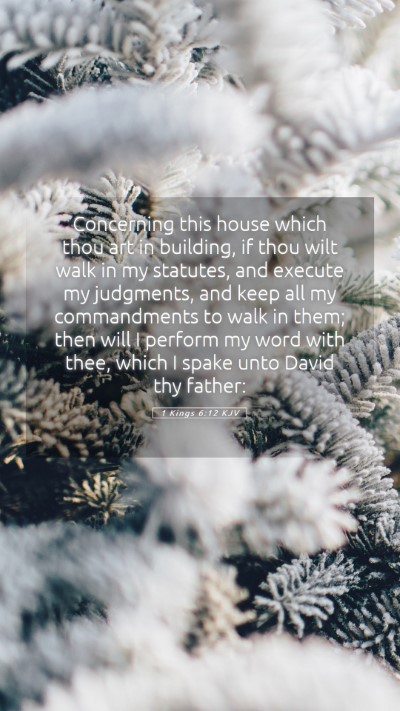Understanding 1 Kings 6:12
Bible Verse: 1 Kings 6:12 - "As for this house which thou art in building, if thou wilt walk in my statutes, and execute my judgments, and keep all my commandments to walk in them; then will I perform my word with thee, which I spake unto David thy father."
Overview
This verse holds a significant place within the narrative of the construction of Solomon's Temple, a monumental structure in the history of Israel. It speaks directly to Solomon, emphasizing the conditional relationship between divine favor and obedience to God's laws. The verse is essential for understanding the spiritual significance of the temple itself as a dwelling for God.
Exegesis and Commentary
-
Matthew Henry’s Commentary
According to Matthew Henry, this verse serves as a divine promise to Solomon that hinges on his adherence to God's statutes. It highlights that while the physical structure of the temple is important, the moral and spiritual integrity of its builder is paramount. God’s covenant with David is referenced, reinforcing the theme of divine faithfulness in response to human fidelity.
-
Albert Barnes’ Commentary
Barnes emphasizes the personal aspects of God's covenant. He notes the importance of walking in God’s ways not just for the success of building the temple, but for Solomon's overall reign. The conditional aspect of the promise indicates that God’s blessings depend on obedience—a theme echoed throughout Scripture.
-
Adam Clarke’s Commentary
Clarke elaborates on the importance of obedience in the context of maintaining a relationship with God. He suggests that this Divine assurance is both a warning and a promise; it stresses moral responsibility while instilling hope that divine assistance is available to those who follow God’s commandments.
Key Themes
- Covenant and Conditional Promises: This verse illustrates the concept of a covenant relationship where God outlines the responsibilities of His people (i.e., obedience) in exchange for blessings.
- The Importance of Conduct: The emphasis on walking in God’s statutes signifies that the ethical and spiritual conduct of leaders has implications for the nation.
- Divine Assurance: God’s promise to perform His word reassures Israel of divine support, reflecting the broader biblical theme of God's commitment to His people.
Application of 1 Kings 6:12
This verse carries significant application for both individual believers and communities today. It echoes the need for adherence to biblical principles in the governance of our lives and actions:
- Personal responsibility in following God’s teachings.
- Understanding the weight of leadership and influence.
- Building one’s life and community upon the foundation of God’s Word.
Cross References
- Deuteronomy 28:1-2: The blessings of obedience.
- 2 Chronicles 7:14: The call for humility and prayer.
- 1 Samuel 15:22: Obedience as better than sacrifice.
Conclusion
In summary, 1 Kings 6:12 reminds us that God's promises are often linked to our actions. Through the lens of biblical commentary, we see the rich implications of obedience in the believer's life and the necessity of aligning ourselves with God's word. For those engaged in Bible study, whether in groups or individually, this verse offers profound insights into God's expectations and the blessings that accompany a faithful walk with Him.


